
Transcription
Between the Bars
BOARD OF PAROLE HEARINGS
CONSULTATION
STATE OF CALIFORNIA
DECISION / ORDER
X Consultation Conducted
X Inmate Present
Inmate Not Present
Consultation Postponed
Reason(s):
FINDINGS / RECOMMENDATIONS
Vocational Training
Findings:
Inmate has not taken any vocational training to date.
Recommendations:
Inmate was advised to enroll in and complete as many vocational programs that are available for the purpose of obtaining marketable skills that can be used for employment upon release. Inmate should confirm that any documents are in the C-File and retain copies when practicable. The inmate was advised the presence or absence of marketable skills is a factor considered for parole suitability.
Work Assignments
Findings:
Inmate is currently on the yard crew. Inmate states he is an artist and has previously received SSI and worked on oil rigs.
Recommendations:
Inmate was advised to maintain employment as available and receive satisfactory or above work reports. The inmate was advised institutional behavior including work assignments and performance is a factor considered for parole suitability.
Rehabilitation Programs
Findings:
Inmate has participated in restorative justice program, criminon, house of healing, living on purpose and other self help.
Recommendations:
A review of the record and information presented at the consultation suggest inmate's actions leading to the life crime may have been influenced by some or all of the following causative factors: impulsivity, associates, gangs, lack of empathy and anger control. The inmate is advised to attend and complete any programs/classes/group meetings/correspondences courses and AA/NA, substance abuse, criminal gangs anonymous, victim's awareness and conflict resolution.
Education
Findings:
Inmate has a 12.9 gpl and a GED and is currently on the list to start college classes.
Recommendations:
Inmate was advised to participate in any and all education opportunities that are available and to continue to upgrade educationally.
NAME: GOEHLER CDC #: K77832 INST: MCSP SCHEDULED DATE: 08/03/2017 ACTIONS DATE: 08/03/2017
BPH 1001 - Consultation Page 1 of 3
BOARD OF PAROLE HEARINGS
CONSULTATION
STATE OF CALIFORNIA
Institutional Behavior
Findings:
Inmate has not remained disciplinary free.
Recommendations:
Inmate was advised that one of the considerations at a parole suitability hearing is inmate's institutional behavior. Inmate was further advised of the extreme importance of remaining disciplinary free pending his initial parole consideration hearing and that misconduct in prison is a factor of parole unsuitability.
Parole Plan
Findings:
Inmate has family in CA
Recommendations:
Inmate was advised of the importance of realistic parole plans. The inmate was advised to develop parole plans that address residency, support groups, relapse prevention, and potential employment or financial support.
Other
Findings:
Recommendations:
INSTRUCTIONS (FOR CDCR USE ONLY)
Case Records - Documents Still Required
Police Report Probation Report Abstract of Judgment/Minute Order Sentencing Transcript
Appellate Decision Current Rap Sheet Other
BPH Instructions
Investigations IPB Other
Legal YOPH Other
HEARING PANEL
TURNER, TERRI - Commissioner [signature] Date: 08/03/2017
[cartoon image of an office with speech bubble saying: IF YOU'LL MOVE CLOSER, IT'LL BE EASIER TO GO OVER THE DETAILS OF THE OPT-OUT CLAUSE]
NAME: GOEHLER CDC #: K77832 INST: MCSP SCHEDULED DATE: 08/03/2017 ACTION DATE: 08/03/2017
BPH 1001 - Consultation Page 2 of 3
BOARD OF PAROLE HEARINGS
CONSULTATION
STATE OF CALIFORNIA
HEARING PROCESS / LEGAL FACTORS
The Board of Parole Hearings conducts parole suitability hearings to determine whether inmates are suitable for parole -- meaning they do not pose a current, unreasonable risk of danger to the public.
Hearings are conducted by a Commissioner and a Deputy Commissioner. Inmates are entitled to legal counsel at their hearings. The District Attorney from the prosecuting county and victims of the crime may attend the hearing.
The panel considers all relevant and reliable information to determine if the inmate is suitable for release. California Code of Regulations, title 15, sections 2281 and 2402 provide factors the panel may consider in determining suitability. Factors tending to show suitability:
-No juvenile record;
-Stable social history;
-Signs of remorse;
-Crime committed as the result of significant stress in the inmate's life;
-At the time of the crime the inmate suffered from Intimate Partner Battery;
-No prior criminal history;
-The prisoner's present age reduces the probability of recidivism;
-The prisoner has made realistic plans for release or marketable skills that can be used upon release; and
-Institutional activities indicate an enhanced ability to function within the law.
Factors tending to show unsuitability:
-Circumstances of the commitment offense;
-Previous record of violence;
-Unstable social history;
-Sadistic sexual offenses;
-Psychological factors (lengthy history of severe mental problems related to the offense); and
-Institutional behavior (serious misconduct in prison or jail).
The panel does not determine the inmate's guilt or innocence of the crime. The panel accepts as established the guilty verdict imposed by the court.
At a life term inmate's initial parole suitability hearing, the panel shall calculate the base term and the adjusted base term. For any life term inmate who has already had his or her initial parole suitability hearing without a calculation of the base term and adjusted base term, the hearing panel shall calculate these terms at the inmate's next parole suitability hearing.
If an inmate is found unsuitable for parole, statutory law requires that the next hearing be set 3, 5, 7, 10, or 15 years in the future. An inmate who is denied parole may request that his or her hearing be moved to an earlier date, based on a change of circumstances or new reasonable likelihood that public safety does not require that the inmate serve the additional period of incarceration imposed. The Board may also advance information that establishes a hearing pursuant to its administrative review process. Penal Code section 3041.5.
Following the panel's decision, the Board conducts decision review for no more that 120 days. Following decision review, the Governor has statutory authority under Penal Code sections 3041.1 and 3041.2 to review all parole suitability decisions and affirm, modify, reverse, or refer to the full Board for reconsideration depending on the circumstances.
NAME: GOEHLER CDC #: K77832 INST: MCSP SCHEDULED DATE: 08/03/2017 ACTION DATE: 08/03/2017
BPH 1001 - Consultation Page 3 of 3
PRISON LAW OFFICE
General Delivery, San Quentin, CA 94964
Telephone (510) 280-2621 . Fax (510) 280-2704
www.prisonlaw.com
Director:
Donald Specter
Managing Attorney:
Sara Norman
Staff Attorneys:
Mae Ackerman-Brimberg
Rana Anabtawi
Steven Fama
Alison Hardy
Sia Henry
Corene Kendrick
Rita Lomio
Margot Mendelson
Millard Murphy
Lynn Wu
Your Responsibility When Using the Information Provided Below:
When putting this material together, we did our best to give you useful and accurate information because we know that prisoners often have trouble getting legal information and we cannot give specific advice to all prisoners who ask for it. The laws change often and can be looked at in different ways. We do not always have the resources to make changes to this material every time the law changes. If you use this pamphlet, it is your responsibility to make sure that the law has not changed and still applies to your situation. Most of the materials you need should be available in your institution's law library.
INFORMATION RE: ELDERLY PRISONER PAROLE
November 21, 2012 (January 2015)
We have received your request for information about new California Department of Corrections and Rehabilitation (CDCR) policies regarding parole of elderly prisoners. We apologize for sending this form letter, but we are unable to provide individual responses to everyone who seeks our help. We hope that this letter will answer your questions.
On February 10, 2014, the three-judge court overseeing the California prison overcrowding class action case (Plata/Coleman v. Brown) issued an order that, among other things, requires the State to put in place a new parole process so that prisoners who are 60 years of age or older and have been incarcerated at least 25 years on their current sentence will be referred to the Board of Parole Hearings (BPH) to determine suitability for parole.
The new Elderly Parole Program applies to prisoners serving indeterminate (life with the possibility of parole) terms and prisoners serving determinate (set length) terms. It does not apply to prisoners serving death or life without the possibility of parole (LWOP) terms. Attached to this letter is a June 16, 2014, BPH memorandum which gives an overview of the program. The BPH has told the three-judge court that as of December 31, 2014, it had granted parole to 115 prisoners eligible for elderly parole.
The same general procedures and legal standards that apply to regular life parole suitability hearings apply to the Elderly Parole Program. This means the BPH may deny parole if an elderly prisoner's release would pose an unreasonable risk of danger to public safety. However, for all Elderly Parole Program hearings, the BPH risk assessments will consider how age and physical condition reduce elderly prisoners' risk of future violence.
Board of Directors
Penelope Cooper, President . Michele WalkinHawk, Vice President
Marshall Krause, Treasurer . Christiane Hipps . Margaret Johns
Cesar Lagleva . Laura Magnani . Michael Marcum . Ruth Morgan . Seth Morris
Elderly Parole Program for Lifers (Prisoners Serving Indeterminate Terms)
Lifers who are 60 years or older and have been incarcerated 25 years or more on their current sentence, and who have not yet had an initial parole suitability hearing, will be referred by the CDCR to the BPH and scheduled for an Elderly Parole Program suitability hearing.
Lifers who are 60 years or older and have been incarcerated 25 years or more on their current term, and who have already been denied parole at the initial suitability hearing will be considered for elder parole at their next regularly scheduled parole hearing. under the Elderly Parole Program. The BPH will give scheduling priority to those prisoners who are most likely to be found suitable for parole, with the length of the most recent denial being used as one factor to determine likelihood of suitability.
The BPH says it has been and will review all 3-year denials annually to determine if a more prompt parole consideration hearing should be scheduled. During that annual review, BPH will consider whether the prisoner meets the elder parole eligibility criteria and if so whether to schedule a hearing sooner than is already scheduled.
Any lifer who eligible for elderly parole, including those with lengthier (for example, five, ten, or fifteen years) denial periods, can file a petition with the BPH asking that their hearing be advanced because they meet the eligibility criteria for elder parole. The BPH will accept petitions from elderly prisoners even if it has been less than three years since the prisoner last filed a hearing advancement petition, but because only one such advancement petition is allowed every three years, the BPH decision will be made based on its own review of the prisoner's situation, not on the petition.
The same general procedures and legal standards that apply to regular lifer parole suitability hearings will apply when an elder parole is an issue. This means the BPH may deny parole if a elderly prisoner's release would pose an unreasonable risk of danger to public safety. However, for all Elderly Parole Program hearings, the BPH risk assessments will consider how age, time served, and diminished physical condition, if any, reduce elderly prisoners' risk for future violence.
Lifers who are found suitable under the Elderly Parole program will be released when the parole grant becomes final (after review by the full BPH and, in some cases, by the Governor), regardless of the release date under the usual term calculation procedures.
If you are an eligible lifer and think the elder parole program is not being fairly applied to you, please write us. We will read your letter and consider whether we can help.
Prison Law Office
Elderly Parole (January 2015)
page 3
Elderly Parole Program for Determinate-Term Prisoners
The BPH will also hold Elderly Parole Program suitability hearings for determinate-term prisoners who are 60 years or older and have served 25 years or more on their current term. These hearings will start in February 2015. BPH will hold a parole consideration hearing for eligible determinate term prisoners within one year of the prisoner becoming eligible (that is, one year from the date the prisoner is both age 60 or older and has also served 25 years on his or her current term).
The same general procedures and legal standards that apply to regular lifer parole suitability hearings will apply when a determinate term prisoner has an elder parole hearing. This means the BPH may deny parole if an elderly prisoner's release would pose an unreasonable risk of danger to public safety. However, the BPH risk assessment done for the hearing will consider how age, time served, and diminished physical condition, if any, reduce an elderly prisoner's risk for future violence.
Determinate term prisoners who are found suitable under the Elderly Parole program will be released when the parole grant becomes final (after review by the full BPH), even if that date is before the date the prisoner would have been otherwise released.
If you are a determinate term prisoner who is eligible for elder parole, and think the elder parole program is not being fairly applied to you, please write us. We will read your letter and consider whether we can help.
*******
If you want more information about the parole consideration process in general or about how to file a state court petition for writ of habeas corpus, please write back to the Prison Law Office to request free information packets on those topics. Some information is also available on the Resources page of the Prison Law Office website at www.prisonlaw.com.
PRISON LAW OFFICE
General Delivery, San Quentin, CA 94964
Telephone (510) 280-2621 . Fax (510) 280-2704
www.prisonlaw.com
Director:
Donald Specter
Managing Attorney:
Sara Norman
Staff Attorneys:
Mae Ackerman-Brimberg
Rana Anabtawi
Steven Fama
Alison Hardy
Sia Henry
Corene Kendrick
Rita Lomio
Margot Mendelson
Millard Murphy
Lynn Wu
July 2015
Information about pending legislation regarding Elder Parole
Some prisoners and others have asked about possible changes regarding elder parole, including asking for information about pending legislation.
In early 2015, a bill (the legal name for a proposed change to the law) was introduced in the California legislature. As originally written this bill, known as Senate Bill or SB 224, would have made more prisoners eligible for elder parole as compared to the current program, by lowering the eligibility age from 60 to 50.
However, SB 224 was amended (changed). As now written, SB 224 would simply make the current elder parole program, as established under the order of the federal three-judge court, a part of California law. Thus, at the present time, there is no legislation or other proposal to lower the elder parole age from 60 to 50, or to otherwise make more prisoners eligible for elder parole.
In addition, in early June, SB 224 was moved to the Legislature's "Inactive File" at the request of the Senator who wrote the bill. Unless SB 224 is removed from the "Inactive File" it will not be voted on by the Legislature. To become law, the bill would have to be passed by the Senate and the Assembly, and then signed by the Governor. We have no further information about this bill.
Information about the current Elder Parole program is enclosed.
Board of Directors
Penelope Cooper, President . Michele WalkinHawk, Vice President
Marshall Krause, Treasurer . Christiane Hipps . Margaret Johns
Cesar Lagleva . Laira Magnani . Michael Marcum . Ruth Morgan . Seth Morris
Other posts by this author
|
2023 may 31
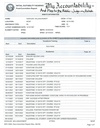
|
2023 apr 5

|
2023 mar 19
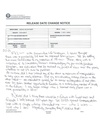
|
2023 mar 5

|
2023 mar 5

|
2023 mar 5

|
More... |
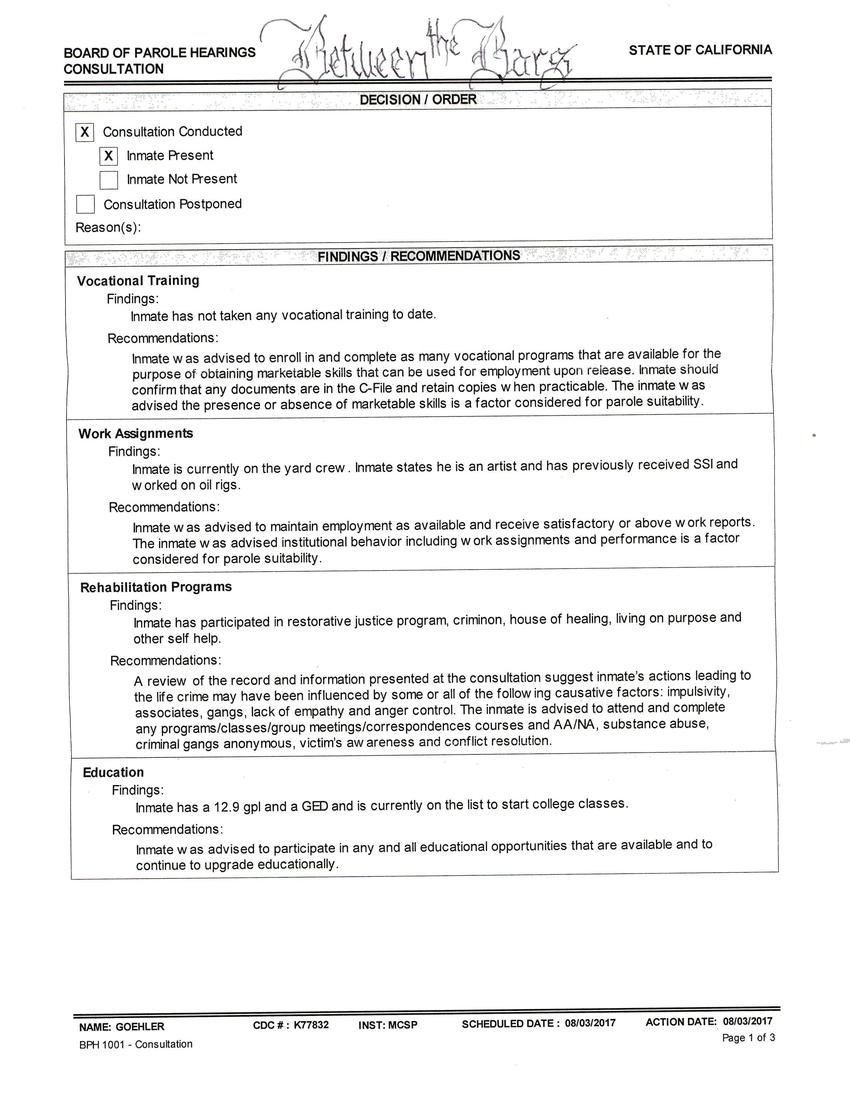
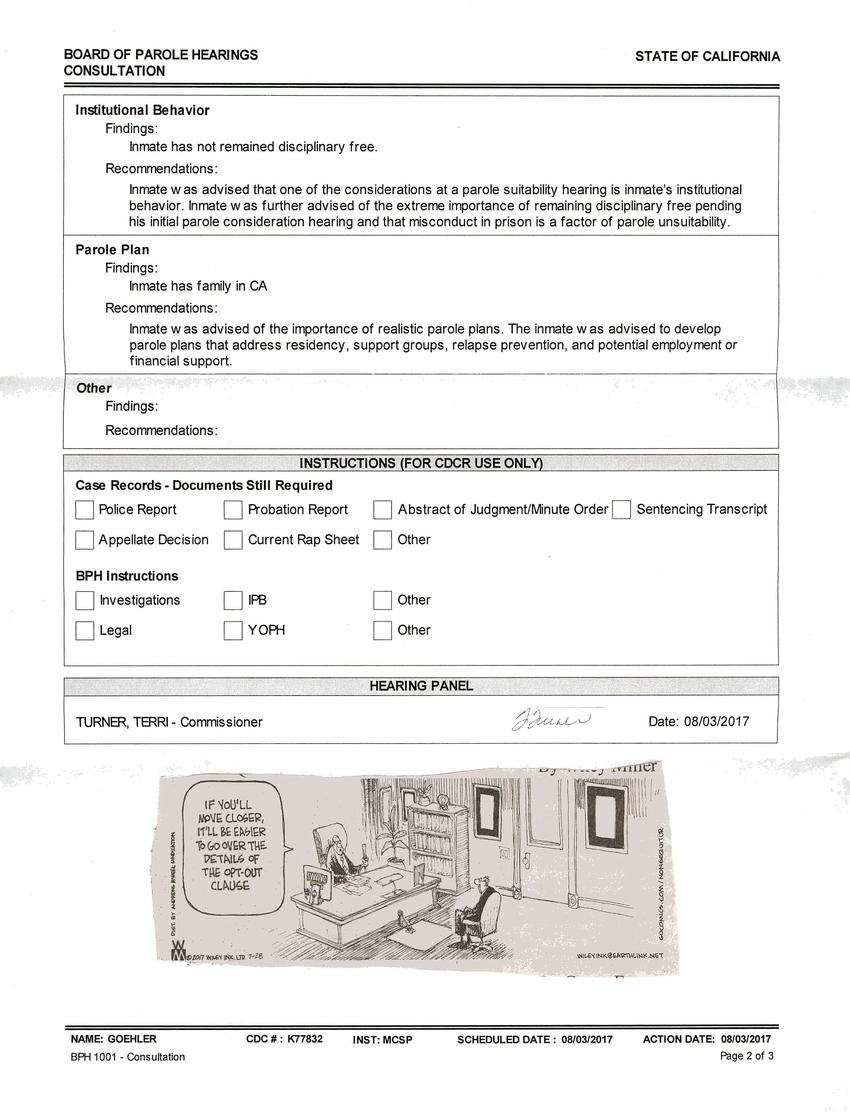
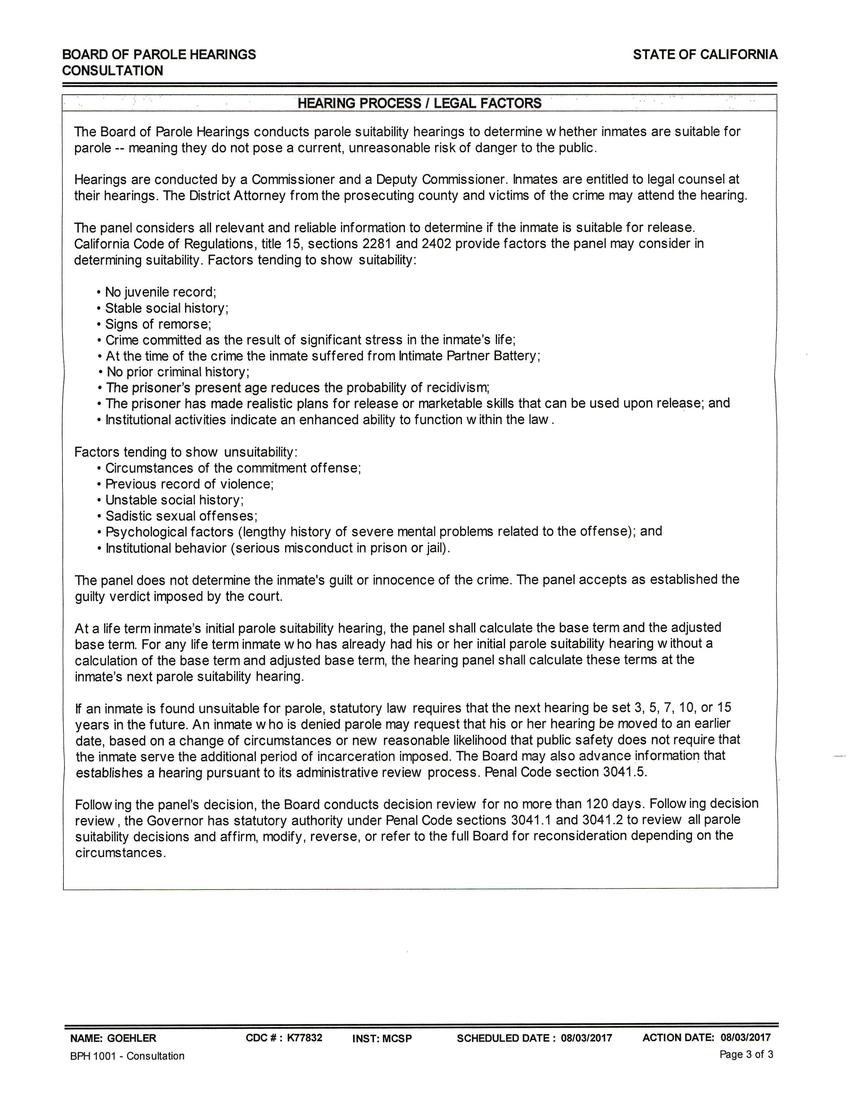
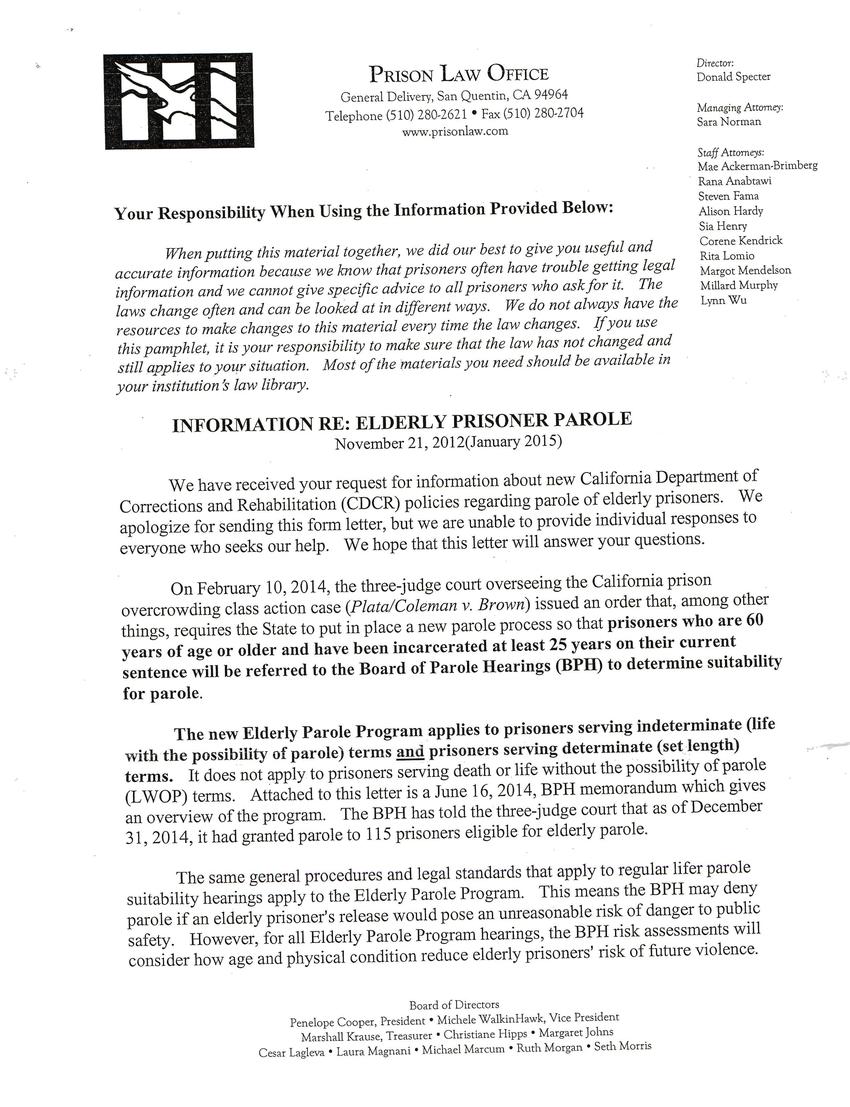
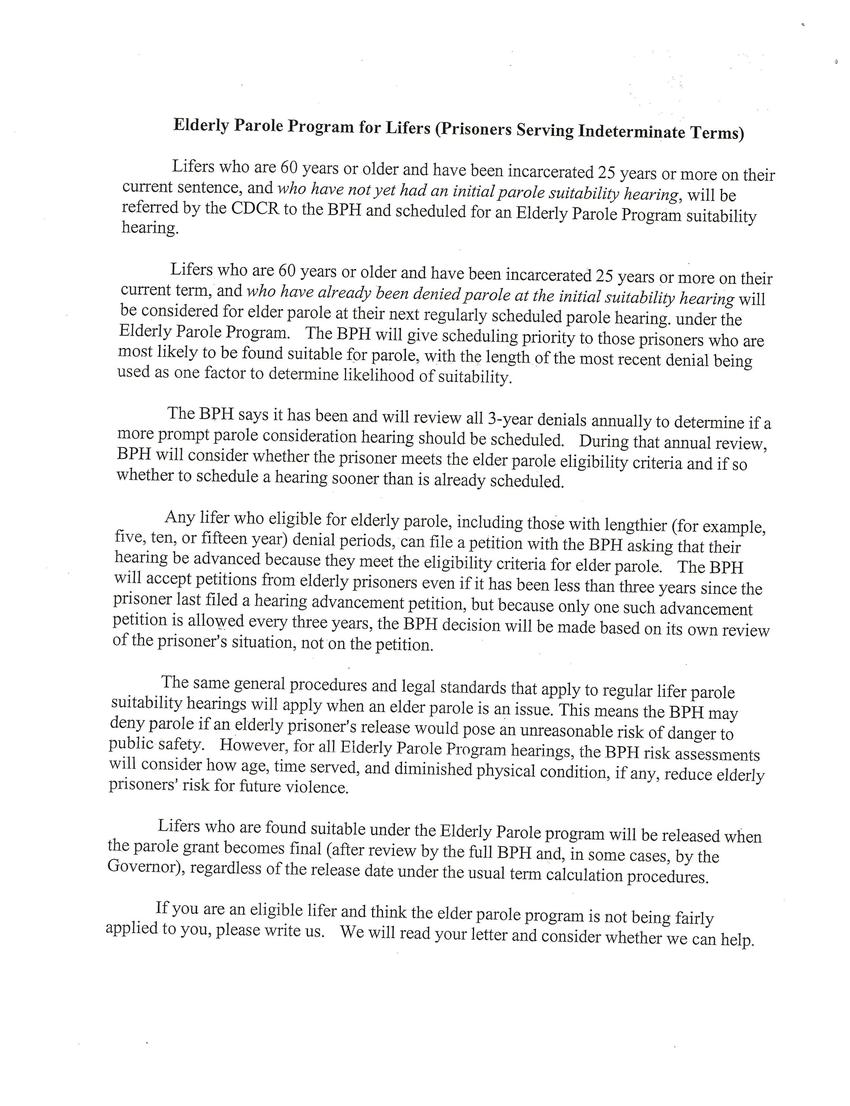
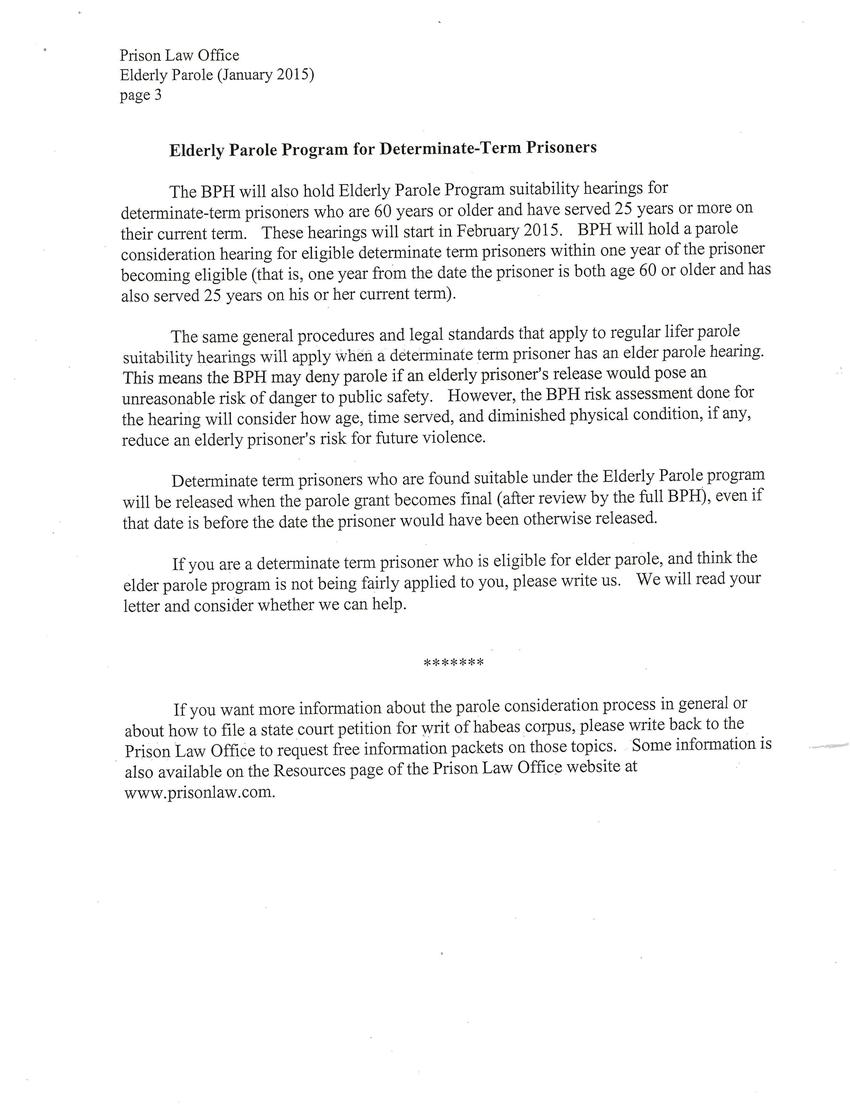

Replies